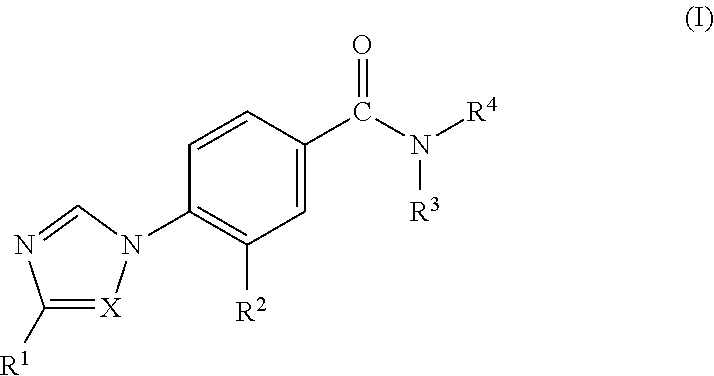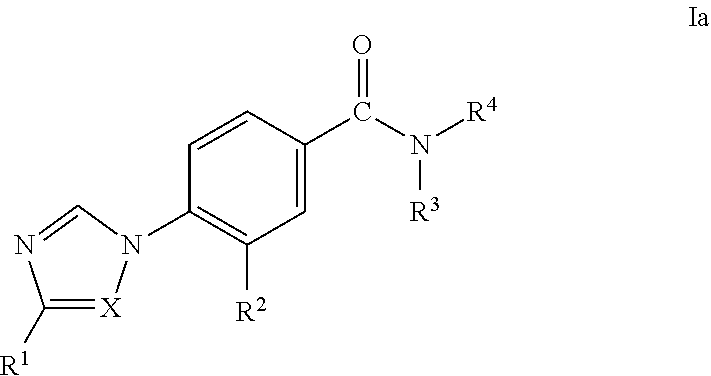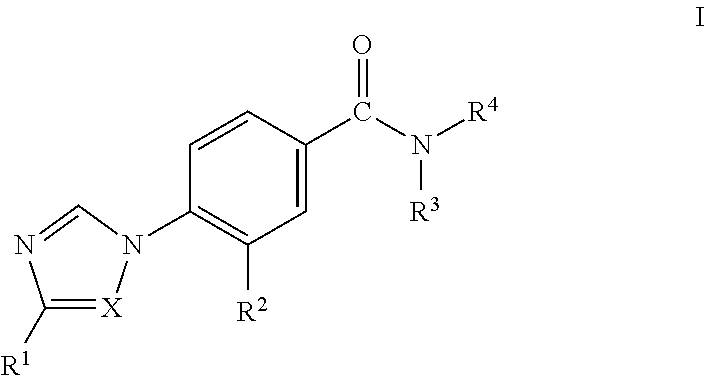Novel Phenyl Imidazoles and Phenyl Triazoles As Gamma-Secretase Modulators
a technology of gamma-secretase and imidazoles, which is applied in the direction of biocide, drug composition, metabolic disorder, etc., can solve the problems of ineffective treatment for halting, preventing, or reversing the progression of alzheimer's disease, and achieves the effects of reducing the risk of alzheimer's disease progression, and increasing the in vivo half-
- Summary
- Abstract
- Description
- Claims
- Application Information
AI Technical Summary
Benefits of technology
Problems solved by technology
Method used
Image
Examples
example 2
Synthesis of N-[2-(4-chlorophenyl)-2-hydroxypropyl]-3-methoxy-4-(4-methyl-1H-imidazol-1-yl)benzamide (2)
[0184]
[0185]Step 1. Synthesis of N-[2-(4-chlorophenyl)-2-oxoethyl]-3-methoxy-4-(4-methyl-1H-imidazol-1-yl)benzamide. 3-Methoxy-4-(4-methyl-1H-imidazol-1-yl)benzoic acid [Example 1], (500 mg, 2.15 mmol), 2-amino-1-(4-chlorophenyl)ethanone (444 mg, 2.15 mmol), O-(7-azabenzotriazol-1-yl)-1,1,3,3-tetramethyluronium hexafluorophosphate (HATU, 0.911 g, 2.32 mmol) and diisopropylethylamine (1.5 mL, 0.86 mmol) were combined in dimethylformamide (10 mL). The mixture was stirred at room temperature for 16 hours, then diluted with saturated aqueous sodium bicarbonate solution (200 mL) and extracted with ethyl acetate (2×200 mL). The organic layers were combined and washed with saturated aqueous sodium bicarbonate solution (2×200 mL), water (2×200 mL) and saturated aqueous sodium chloride solution (150 mL). The organic layer was dried over magnesium sulfate, concentrated in vacuo, and purifie...
example 3
Synthesis of N-[2-(3-chlorophenyl)ethyl]-4-(4-methyl-1H-imidazol-1-yl)-3-(prop-2-yn-1-yloxy)benzamide (3)
[0187]
[0188]Step 1. Synthesis of 3-methoxy-4-(4-methyl-1H-imidazol-1-yl)benzaldehyde. 4-Fluoro-3-methoxybenzaldehyde (85 g, 0.55 mol), 4-methyl-1H-imidazole (90.5 g, 1.1 mol) and cesium carbonate (268.8 g, 0.82 mol) were combined in dimethylformamide (1.7 L) and stirred at 100° C. for 1 hour. The mixture was cooled to room temperature, filtered, and the filtrate was concentrated in vacuo. The residue was dissolved in water (2 L) and extracted with ethyl acetate (3×2 L). The combined organic layers were washed with water and brine, dried over sodium sulfate, and concentrated under reduced pressure. Chromatography on silica (Eluant: 2:1 petroleum ether: ethyl acetate) afforded a yellow solid, which was recrystallized from ethyl acetate (300 mL) to provide the title compound as a white solid. Yield: 17.8 g, 0.082 mol, 15%. 1H NMR (300 MHz, CDCl3) δ 2.31 (d, J=1.0 Hz, 3H), 3.97 (s, 3...
example 4
Synthesis of N-{[3-(3-chlorophenyl)isoxazol-5-yl]methyl}-3-methoxy-4-(4-methyl-1H-imidazol-1-yl)benzamide (4)
[0194]
[0195]Step 1. Synthesis of 3-chlorobenzaldehyde oxime. Hydroxylamine hydrochloride 593 mg, 8.54 mmol) was added to a solution of 3-chlorobenzaldehyde (0.81 mL, 7.1 mmol) in pyridine (4 mL), and the reaction mixture was stirred for 18 hours at room temperature. The reaction was concentrated under reduced pressure, and the residue was partitioned between 10% aqueous sodium carbonate solution and ethyl acetate. The aqueous layer was extracted with ethyl acetate, and the combined organic layers were concentrated under reduced pressure to afford the title compound (contaminated with pyridine), which was used without purification in Step 3 below. Yield: 1.5 g, assumed quantitative. 1H NMR (500 MHz, CD3OD), product peaks only: δ 7.33-7.35 (m, 2H), 7.48 (m, 1H), 7.61 (m, 1H), 8.05 (s, 1H).
[0196]Step 2. Synthesis of 3-methoxy-4-(4-methyl-1H-imidazol-1-yl)-N-prop-2-yn-1-ylbenzami...
PUM
| Property | Measurement | Unit |
|---|---|---|
| Volume | aaaaa | aaaaa |
| Volume | aaaaa | aaaaa |
| Volume | aaaaa | aaaaa |
Abstract
Description
Claims
Application Information
 Login to View More
Login to View More - R&D
- Intellectual Property
- Life Sciences
- Materials
- Tech Scout
- Unparalleled Data Quality
- Higher Quality Content
- 60% Fewer Hallucinations
Browse by: Latest US Patents, China's latest patents, Technical Efficacy Thesaurus, Application Domain, Technology Topic, Popular Technical Reports.
© 2025 PatSnap. All rights reserved.Legal|Privacy policy|Modern Slavery Act Transparency Statement|Sitemap|About US| Contact US: help@patsnap.com



